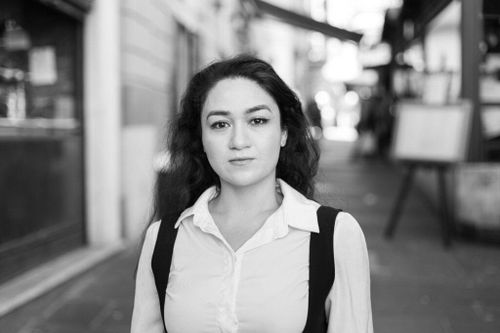Is my t-shirt made with Uyghur forced labour?

Jewher Ilham advocates for the end of Uyghur forced labour, carried out in camps like the one where her father is detained. How to encourage governments, companies and individuals to be aware of the origin of their products?
‘Did my imprisoned father, cousin or uncle make this shirt?’ This is a question Jewher Ilham often asks herself when holding a piece of clothing. Jewher Ilham saw her father for the last time on 2 February 2013 at Beijing International Airport. Right before they would take a flight to the United States. Ilham Tohti was arrested in 2014 and has since been sentenced to life in prison. Jewher hasn’t heard of her father since 2017 and doesn’t even know if he is still alive.
Almost one fifth of all cotton comes from the Xinjiang Uyghur Autonomous Region, often handpicked with forced labour by Uyghurs. Jewher Ilham advocates for the end of Uyghur labor exploitation and calls on international brands to remove all materials produced in Xinjiang from their supply chains.
In 2024, the EU passed a Forced Labour Regulaton that requires companies to prove that their products are free from forced labour. Member states need to incorporate this in their national legislation by 2027. Now, however, the Corporate Sustainability Due Diligence Directive (CSDDD), which is a fundamental piece of legislation that will work in tandem with the forced labour ban, is under attack with the new omnibus proposal. How to motivate brands to end using materials from Xinjiang? And how to encourage governments and individuals to be aware of the origin of their products?
About Jewher Ilham
Jewher Ilham (1995) is a Uyghur human rights activist based in the United States. She works for the Workers Rights Consortium and is a spokesperson for the Coalition to End Forced Labour in the Uyghur Region. As the daughter of Ilham Tohti, an economist, writer and outspoken activist for the Uyghurs who was imprisoned for life, Jewher Ilham continues to carry the torch of her father’s advocacy.
Freedom is something that we in the Netherlands often take for granted. Four times a year, De Balie invites someone who knows from personal experience what it means not to be free. We want to share their stories, spread their message, and learn from their struggle. In the series, De Balie has welcomed freedom fighters like Egyptian writer and activist Nawal el Saadawi, Ugandan LGBT activist Frank Mugisha, and Hungarian journalist Veronika Munk. The Freedom Lecture is made possible by Vfonds.